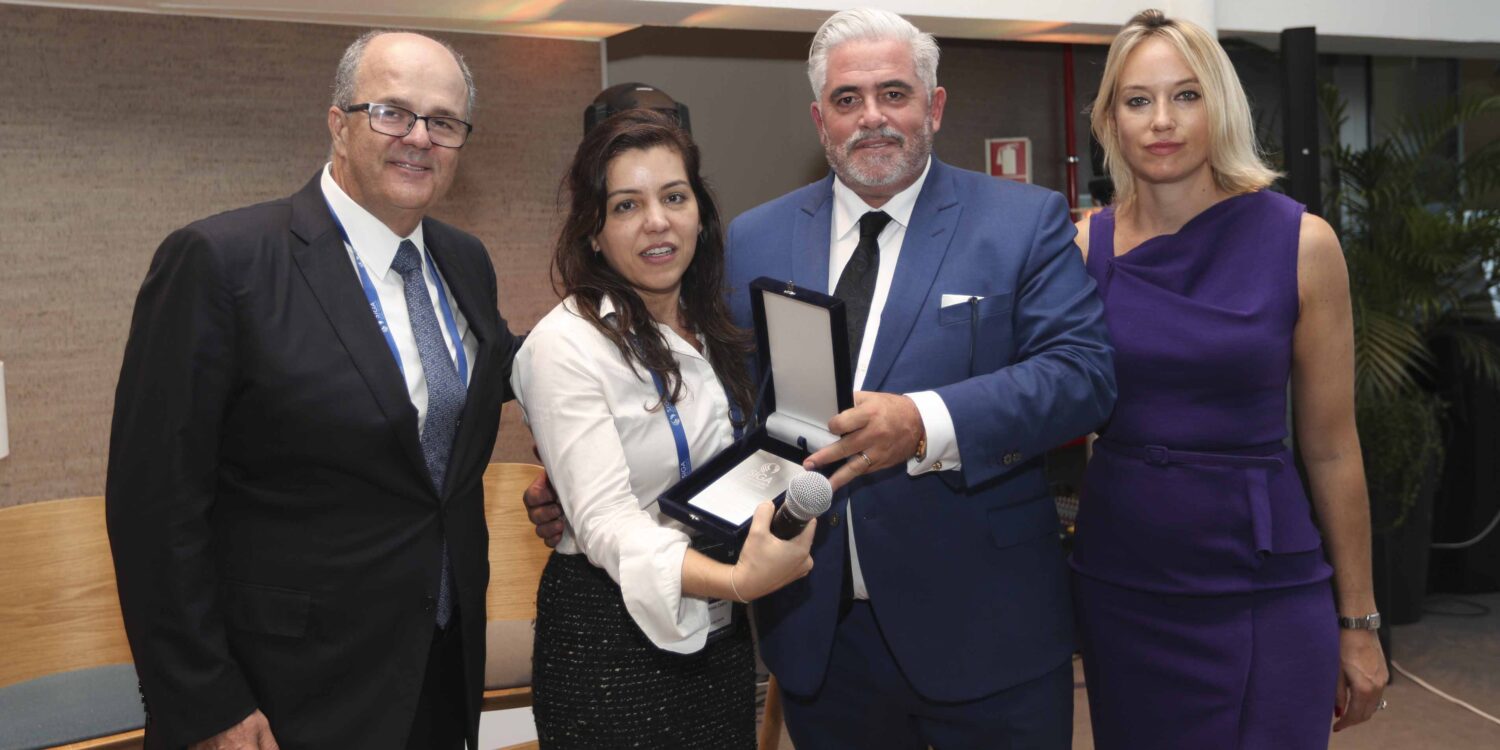Day 2 set the bar for a week full of learning and collaboration aimed at advancing a more protected sporting environment. So what was discussed over the course of the week’s first full-day schedule? Sessions covered sustainable approaches to sporting projects, external factors and corruption, financial influences, and youth development. But before jumping into a summation of sessions’ content, let’s mention how the day begun.
Emanuel Macedo de Medeiros, SIGA Global CEO, welcomed everyone, emphasising the importance of the collective effort to enhance sporting integrity.
The Opening Session was supported by Maria Francesca Spatolisano (United Nations, Assistant Secretary General).
The importance of a collective focus on integrity was echoed later in the day as Andreia Vale (CNN Portugal) interviewed Portuguese judoka, Telma Monteiro. Being an Olympic and World medallist, Monteiro is accustomed to success. However, as she put it, “athletes might be tempted to follow different routes to success, so we must have integrity”. This showcased the importance of organisational guidance – especially that of direct athlete support personnel – to steer and protect athletes. She also highlighted that athletes need to be involved and use their platforms, as i t’s their responsibility to lead by example and raise incidents against sporting codes.
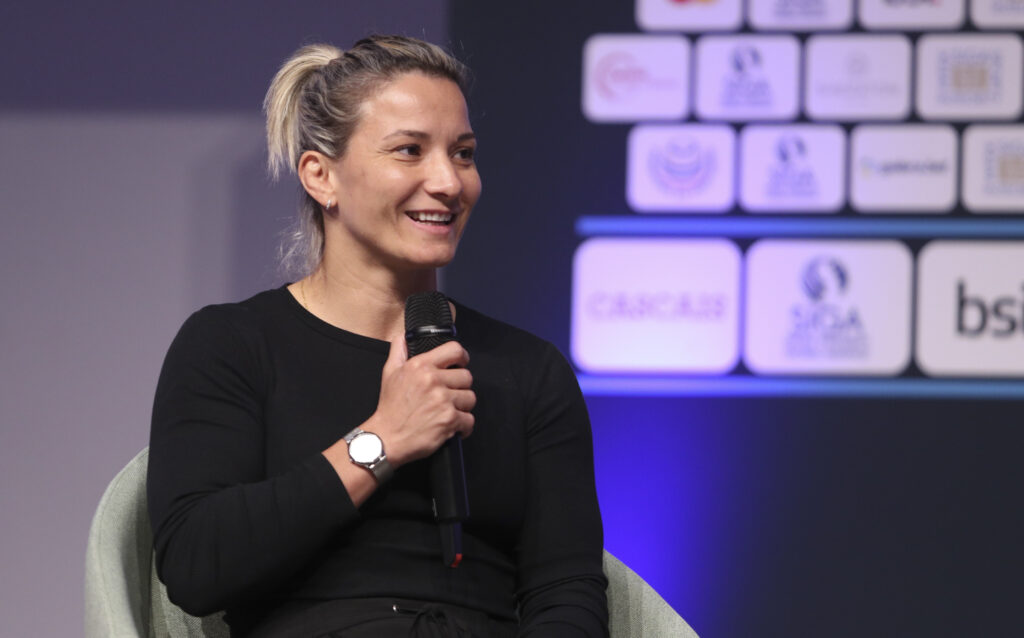
“It’s just me, if I win, I can celebrate proudly”, Telma Monteiro
SUSTAINABILITY
The day’s first Panel Session – consisting of Leaders from the United Nations (UN), Liverpool FC Foundation, Formula E, and BSI – discussed how sport can foster a more sustainable world. In 2015, the UN established 17 Sustainable Development Goals (SDGs) as impact areas for local and international prosperity. Embedded in this agenda are targets to have a substantial impact on climate change. Importantly, the SDGs also highlight the significance of sustainable projects to generate long-standing, wide-felt social impact.
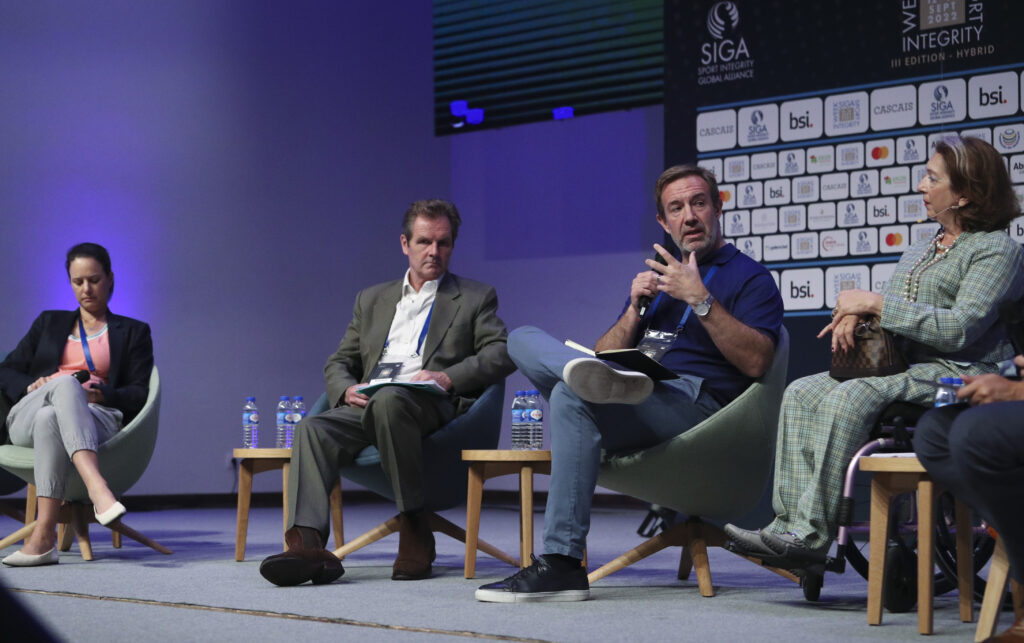
Sustainability was approached from a number of different avenues, highlighting not just environmental impact, but also the requirement for continuous operation of social impact projects. Focusing on the latter initially, Daniela Bas (UN) noted almost instantly that “sport can help the concept of peace, [helping people] to become tolerant”. To do so, though, local infrastructure and resource needs to facilitate fun, enjoyable sport, whether that is in rural or urban areas, to help encourage lifelong physical activity engagement. Independent reviews, like those by SIGA and BSI, help check and challenge, assessing risks and identifying opportunities.
“Not just a box ticking exercise” – Murray Sayce, BSI Global Head, Sustainability Assurance
The UN themselves do significant work on this issue, visiting developing countries to disseminate knowledge at the bottom of the sporting pyramid and they are now in the process of finalising a toolkit to aid further learning. Similarly, Formula E’s Safe and Healthy Environment Fund is empowering and educating children to take action. Although, we aren’t just relying of international bodies to influence change through the SDGs. As Matt Parish, representative of Liverpool FC Foundation, said, a collaborative approach by smaller partners is needed. Whether that’s local organisations banding together to access financial grants or sports organisations uniting their fan following to give back to their community, for example through Liverpool’s “The Red Way”.
The introduction of new sports is also helping improve sustainable measures. Formula E is the perfect example of this, intentionally employing measures targeting SDGs – achieving net zero. The Championship unequivocally champions climate change awareness. This commitment has convinced sponsors, who previously only produced environmentally damaging products, to invest further into green processes and social impact projects. In addition, the performance developments within the sport are also actively contributing to the wider transportation industry.
The lunch-time Building Bridges Between Islands session went into the detail about the successes of sharing best practice across partners, or in this case, nations. Robert daCamara and Rui Marote – both Presidents of their island’s Football Association – emphasised that whilst being leaders of smaller island federations has its challenges, collaborative working allows for a network of knowledge transfer and the creation of mechanisms for change. This network has recently been held up due to the covid-19 pandemic and Freddie Evans (Bermuda National Athletic Association) called for the return of the shared learning to “connect people through sport and culture”.
ANTI-CORRUPTION
Sport requires the highest governance and integrity standards to operate as a credible and respected industry. Yet, there is a plethora of examples to the contrary and the lack of up-to-date regulation does little to restrict instances of corruption. Sport engages billions of people, producing a hugely profitable industry. This, of course, attracts criminal engagement and/or illicit administrative acts. These crimes include match-fixing, bribery, mobilising groups to rig elections, fraud, and counterfeiting sports apparel.
Despite this genuine threat, there is not a united approach from government and non-government organisations to tackle this. Over the last 5-6 years, there has been an accountability for sports clubs to find solutions to issues found on field of play (i.e. match-fixing). However, in parallel, governments need to step in and fight corruption and crime outside of the field of play. It was concerning to hear from Lorenzo Salazar (OECD) that, whilst corruption within sport was brought up within recent G20 meetings, the majority of countries did not accept specific sporting anti-corruption controls. David Luna of (ICAIE) also raised the issue of sport washing, whereby some “governmental partners having an atrocious record on human rights”, yet hide behind sporting events.
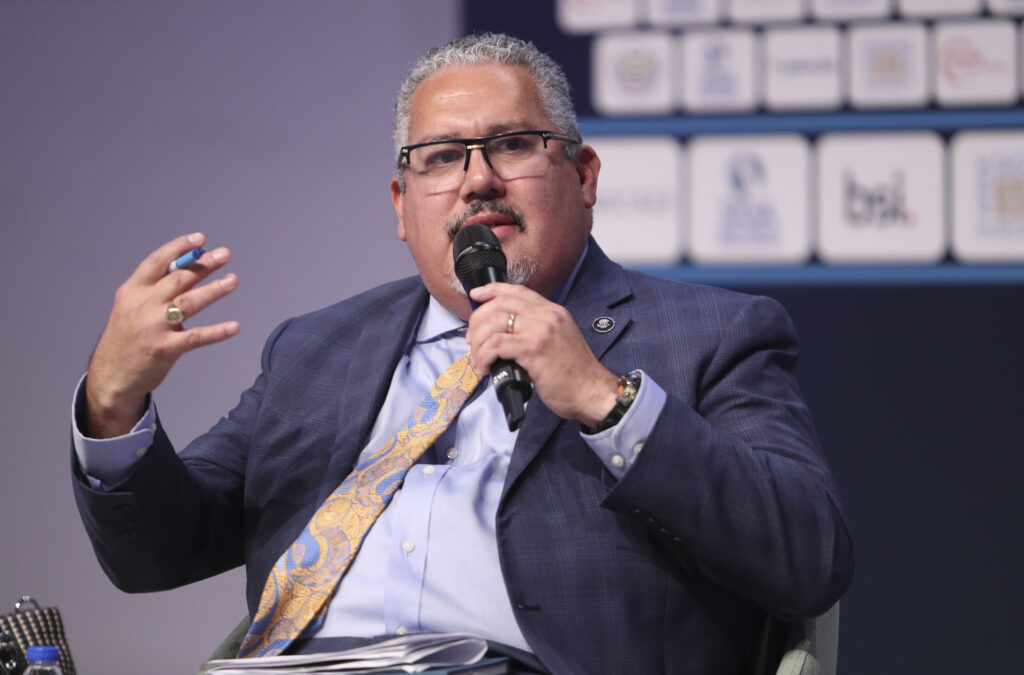
“Members of G20 are a problem not taking sport corruption seriously” – David Luna (International Coalition for Illicit Economies)
Giovanni Tartaglia Polcini (G20 Italy) called for more organisations like SIGA to take action against corruption in sport. With this, we need to target prevention, not justice, as a sector for efficiency purposes. Ronan O’Laoire, who is responsible for the UNODC’s Programme on Safeguarding Sport from Corruption and Crime, brought forth three key areas of focus.
- Strengthening existing laws and create anti-corruption strategies – the latter not currently being implemented specifically within the sporting domain.
- Regulations need to be underpinned by laws and frameworks – the sport and criminal justice world need to be brought together to find united ground.
- Understand the actual problem – we know crime impacts sport, but the actual scale/specifics are unknown.
LaLiga President, Javier Tebas, built on this topic during the 3pm Keynote, “what happens on the field or the court must be authentic”. Organisations need to be vigilant to ensure that illegal activity doesn’t integrate the sport and stain the outcome. Tebas brought forth thoughts about security, not just fan safety, but protecting against piracy of viewership through illegal streams. His thoughts also posed a good question to the conference attendees. How can we achieve economic stability if associations and courts don’t enforce the regulation?
The testimonial segment including Alexandre Miguel Mestre (Abreu Advogados) challenged the industry to act now. Mestre brought to attention a number of measures for consideration. Namely, removing financial barriers to bringing forth cases, aligning jurisdiction with fair processes, and creating an overarching sanction system to advise all sports on aspects of corruption – much like WADA for anti-doping. Pedro Machado (Single Resolution Board) expanded on these thoughts, noting how standards alone aren’t enough. He clarified that positive behavioural and cultural changes within the top tier of sporting governance is criterial to drive this change.
This isn’t just talk, though. Organisations are coming out with tangible action. World Rugby have just appointed an Independent Ethics Officer to initiate their newly formed Integrity Code. Praised by Emanuel Macedo de Medeiros for World Rugby being a “lighthouse”, Alan Gilpin, commented that World Rugby’s reform occurred to focus on transparency and representation to build trust. The timing of this is ideal with next year’s Rugby World Cup on the horizon, showcasing the sport’s values to new audiences and, hopefully, future players. Fan and player consultation was paramount during the initial stages of the Code’s development to determine the membership’s drive for equality, welfare, and accountability. This best practice is something that all Governing Bodies should take note… will this be a watershed moment for others to follow suit?
Similarly, the newly created Executive Education Certificate: Good Governance in Sport is one such way for organisations to kickstart their integrity journey. The self-paced course – operating through Lunex University in Luxembourg – enhances individual and organisational thinking and procedures to protect sport.
FINANCIAL TRANSPARENCY
Financial integrity and transparency are cornerstones of good governance in sport. Panel 3 provided insight into how result-driven collaboration, appropriate governance reforms, and stakeholder engagement can lead to greater fiscally responsible. Incidents of non-payment of wages, delayed transfer payments, and substantial annual losses helped introduce measures within football. UEFA, through club licensing, enforced clubs to demonstrate financial stability. Ever evolving, the incoming Financial Stability Regulations go a step further towards club financial transparency. Philippe Rasmussen, Head of Financial Sustainability at UEFA, did note that this only applies to clubs competing in the European football tournaments and, although there are domestic regulations, the complexities of establishing a single overarching legislation is too challenging.
European Leagues have also asked for regulation on club ownership, so that incidents of criminal acts, bankruptcy, and links with unethical organisations by potential buyers are flagged. Knowing exactly who owns clubs, and their relationship with others, will go ways to prevent the shift of players and money laundering. Greater clarity on ownership and financial behaviour will also give sponsors greater comfort. João Pedro Paro Neto, Mastercard, highlighted that before they enter partnerships they present the governance procedures and impact projects they expect. To answer why Mastercard has been with SIGA from the off, Neto simply responded, “to help ensure good governance and be connected to best practice”.
Panel 4 covered the nuances of the sports betting industry. The group noted a number of benefits to sports by embracing betting, from increased fan engagement and excitement, to the revenue generation of sports data sales and sponsorship. The risks, however, are considerable if not regulated. Firstly, with many staff aware of specific information relating to an athlete’s or team’s performance, tactics, or set up, there is the opportunity for insider trading of information. One such way to counteract this is through mandatory employee education tutorials, like that within NASCAR, and enforcement that anyone who works within a sport cant bet on it. Another risk was brought up by Adrian Ford from Football DataCo around prop bets – minimal incident bets are usually associated with specific plays. Fortunately, when regulated, there are hundreds of staff trained to determine irregularities. Regulation is needed if sports betting is to expand into other areas of the world (South America, Africa, & Asia), but establishing a global jurisdiction was discussed to be difficult by Ian Smith, who approached the problem from an e-sports perspective, due differing national laws and processes.
YOUTH DEVELOPMENT
The significance of the development sessions did not falter despite being scheduled at the end of the day. SIGA launched the newest strand, Youth Development and Protection in Sport, that joins the Universal Standards. Widely praised, this change embodies the sporting sector’s long-held prioritisation of safeguarding children and young people within sporting pathways and providing opportunities for the development of (non-)athletic skills.
All to recently there is prevalence of unfair, unethical, and illegal sporting conditions affecting minors, notably, the abuse within the United States’ gymnastics programme and the systematic doping of Russian athletes. These are high-profile incidents and, unfortunately, other such situations are prevalent at local levels. The launch of the guidelines focusing on youth development and protection will spur improved procedures.
Emanuel’s passionate monologue about the importance of integrity within sport was, itself, a call to action for all sporting originations to hold themselves accountable under these new standards.
“What is a vision without tangible pillars, without a roadmap? This has laid down by a group of visionary leaders who have been with SIGA from day one. Not to judge, not to finger point, not to shame. Rather to inspire, rather to encourage, rather to facilitate. We have come a long way with the three standards, governance, finance, and sports betting, but there was one missing from the offset. Growing the circle, youth development and child protection was added.”
The independent multi-organisation task force produced and refined the standards. Importantly, these standards are susceptible to being audited. This is BSI’s commitment to SIGA through independent, trusted support during the verification process. The released framework provides clarity to the required commitment to the areas of focus (recruitment, training, education, & protection) at bronze, silver, and gold levels.
The final panel of the day brought together Safe Sport, Major League Soccer, and the National Olympic Committee of Portugal to provide context to implementing these standards. Ju’Riese Colon detailed Safe Sport’s involvement before discussing the safeguarding limitations within the United States of America. Safe Sport is leading the way in support and education regarding youth protection, however, only being funded to care for athletes and coaches within the (Para)Olympic movement, results in huge numbers of domestic athletes being active through parks and recreation and university programmes missing out. This scenario additionally extends to other nations, whereby Joao Paulo Almeida highlighted how European nations are lagging behind.
An interesting conversation followed probing the importance of winning vs athlete safety and development. A panel consensus noted that “win at all costs” may result in overlooking situations that might be putting young people at risk and that holistic athlete development should be the priority. For those interested, there’s some really interesting European research and practice on supporting student-athletes to achieve, and not just within sport.
With many nations not having organisations similar to Safe Sport, nor access to funding to establish and maintain such support, our MC for the day, Filipa Pereira, questioned the group: should we wait for high-profile cases to occur in our nations before taking action?
“I think it’s important for us to continue to recognise that changing policy, practices, and culture is going to take time, but there’s been a lot of movement across the globe when it comes to approaches to make sure that that happens. The moment we start to embrace the consistency for safeguarding, is the moment our children will be safe” – Ju’Riese Colon, CEO, US Center For Safe Sport
CELEBRATIONS
Today’s conference also saw a number of organisations publicly pledge their support to the global sporting integrity movement. Cooperation Agreements were signed by Liga Portugal. Pedro Proença, President of Liga Portugal, committed himself and the Portuguese Professional Football structure to adopt SIGA Universal Standards in Good Governance and go through SIRVS.
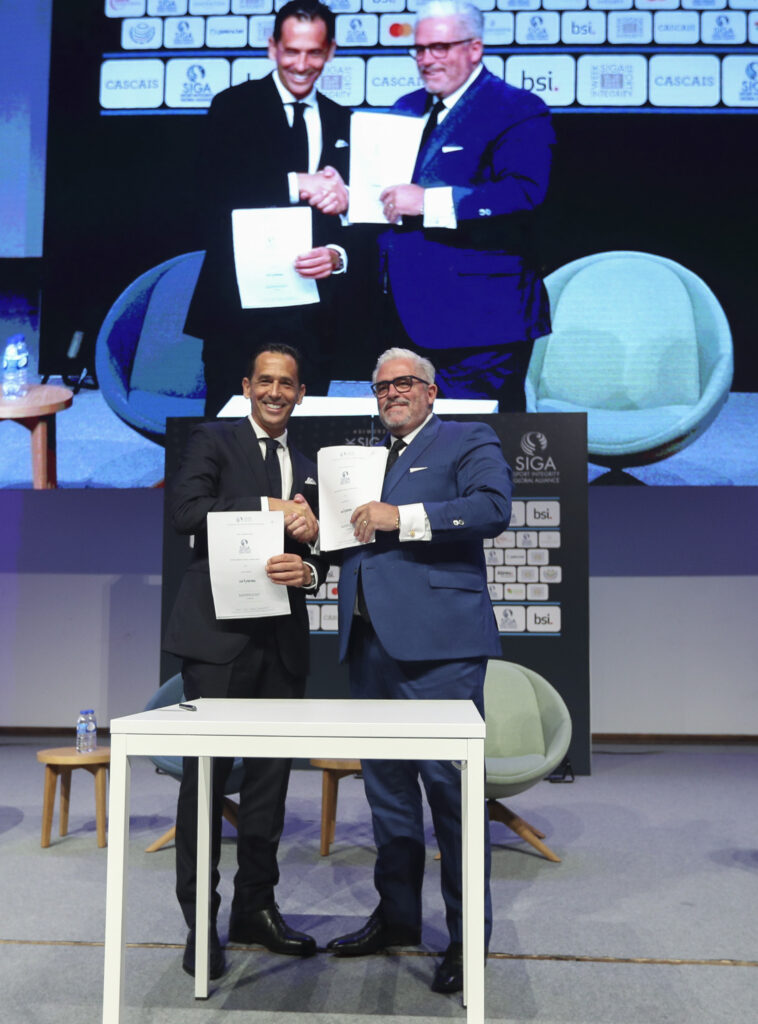
Football organisations were in central stage of Sport Integrity Week day 2, as Claus Thomsen remotely sealed a Memorandum of Understanding with SIGA, to strengthen cooperation between both organisations.
“In collaboration with all staff and colleagues, thank you for SIGA entering this area and giving it the focus it needs. It’s important that this has someone’s focus at all times, as the rest of us and running around handing the day-to day.” – Claus Thomsen, CEO, Danish Professional Football
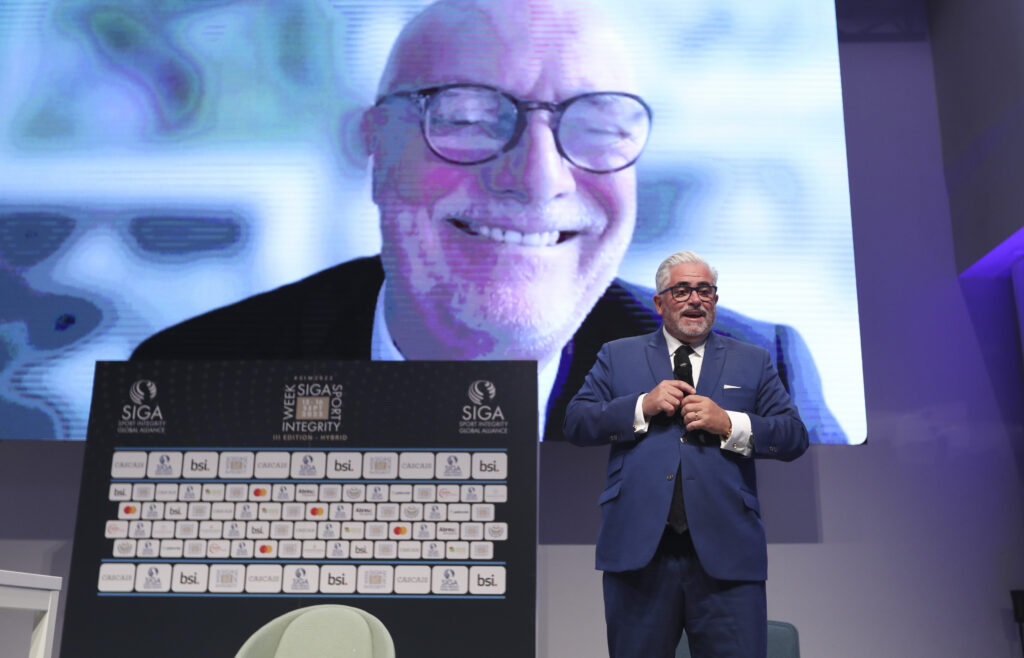
The evening’s celebrations – for those fortunate enough to visit the Municipality of Cascais in the Portuguese Riviera – also facilitated the announcement of the Special Recognition Award posthumously presented to João Paulo Diniz for his commitment to sporting projects within Brazil. The avid triathlete and advisor to Instituto Península also supported the expansion of SIGA into Latin America. The work from this branch of SIGA will help continue Diniz’s legacy.
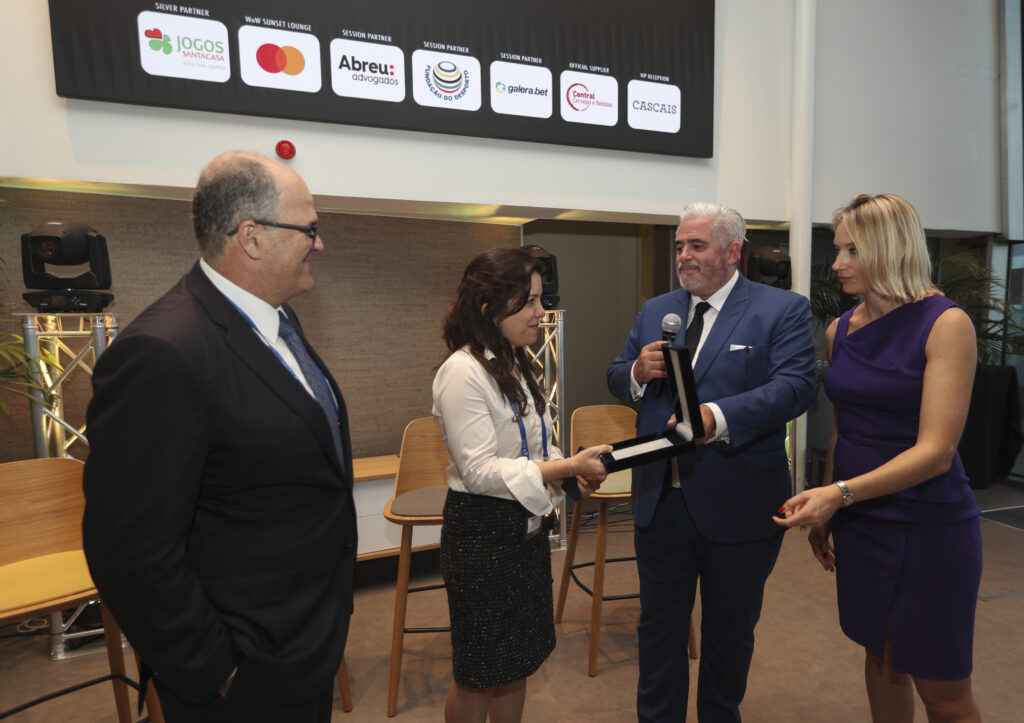
To participate live in the remaining SIW sessions, sign up here. Day 3 builds on today’s sessions, with panels covering brand and athlete engagement, technology, and Equality, Diversity, and Inclusion.
– THE END –
AUTHOR
Tom Edwards
SIGA Youth Council Member
Sport Development and Performance Manager, Surrey Sports Park/University of Surrey (UK)
ABOUT SIGA
SIGA is the world´s leading organisation for Sports Integrity. Supported by more than 200 international multi-industry supporters, we are creating a whole new landscape for the global sports industry by promoting the implementation of the highest integrity standards and delivering independent global rating and certification for Sport.
Funded by its members, SIGA is the only organisation to bring together all key stakeholder groups – Sport, Government, International Organisations, Global Business and Civil Society – from every region in the world, around one critical, fundamental Cause: to foster greater Integrity throughout Sport.
SIGA is headquartered in Geneva, Switzerland, as a non for profit association, funded by its members, and comprises of the following continental subsidiaries: SIGA AMERICA, SIGA EUROPE and SIGA LATIN AMERICA.
Click on the hyperlinks for the list of SIGA Members and Committed Supporters and SIGA Partners.
For more information on SIGA, including its vision, mission and reform agenda, please refer to the website: www.siga-sport.com.
To contact SIGA, please email: comms@siga-sport.com.

